
The choice to homeschool should not be taken lightly. It demands a significant amount of time, prayer, and patience. Whether you are a newbie homeschooler or a veteran in need of inspiration, I hope the following resource list will be helpful!
Getting Started
When I initiated homeschooling in 2011, I didn’t even know where to begin. I knew what subjects I wanted to cover, but…
…I had never taught a preschooler
…I was unsure how to teach a kid to read
…and I didn’t know how much time we should spend schooling!
If you are new to homeschooling, I recommend the following:
- PRAY. (Shouldn’t this always be step 1?)
- Make a short list of goals for your homeschool. What do you want your child to learn in the short term, and what do you hope they will gain in the long term?
- Determine your teaching style and your child’s learning style. One of the best books I’ve used for this is Cathy Duffy’s 102 Top Picks for Homeschool Curriculum. Duffy begins the books by covering various homeschool philosophies (such as Classical, Charlotte Mason, Eclectic, etc.) and helps the reader identify both their teaching style and their child’s learning style.
- Research the how. How do you want to instruct your child? Will you use online classes, a homeschool co-op, and/or an all-in-one curriculum?
- If possible, track down some veteran homeschool moms and ask to look at their curriculum or visit their co-ops.
If you’re starting in Elementary…
Playing, singing, and listening to read-alouds, are some of the best ways for early elementary students to learn. My children still remember memory verses and geography songs from their earliest years because they were set to music! Play helps to engage gross and fine motor skills. Hearing poetry and age-appropriate books—particularly if they sit close to you or are allowed to do something enjoyable at the same time—can develop a love of reading. Establish a daily/weekly routine so they know what to expect.
If you’re starting in Middle School or High School…
These are some difficult years. Middle school is hard whether you’re in public school or not! You will be dealing with hormonal changes, some rebelliousness or questioning, and definite insecurities. Work toward helping them become more independent learners. Work with them on scheduling their time. They need to learn how to take notes, write papers, and develop critical thinking skills.
If you’re starting in High School…
If you are beginning at this stage, you must discuss what your son or daughter wants to do after high school. Do they want to go to college? Is there a trade or vocation they would like training for? You’ll need to reassess their needs each year!
Let’s get started with resources…
The following resources are ones that I have experience with and would recommend. There are many options out there, but I hope you’ll find these helpful!
An “All-in-One” Curriculum
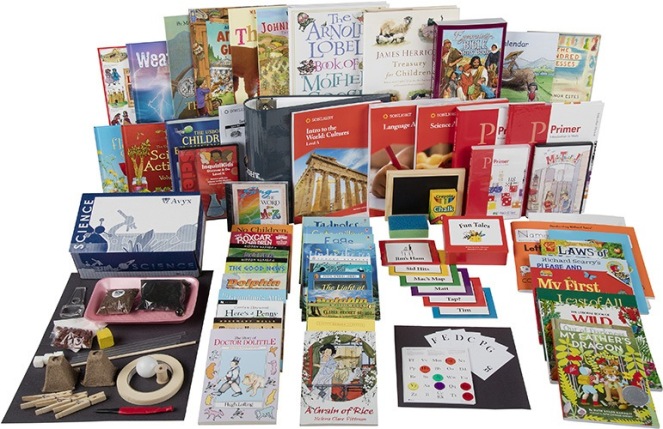
During my first year, I stumbled on the Sonlight Curriculum, and I am so very glad that we started here. Sonlight is a curriculum based around the Charlotte Mason method of instruction which relies heavily on quality literature, outdoor exploration, and summarizing of information by the child. This program supplied me with handwriting, bible, math, language arts, history, science, and literature all in one set. In addition, they supplied me with a suggested schedule. When you purchase, they give you the option of a 4 or 5-day program. If you don’t have time or energy to chase down various curricula, this is a great place to begin! Their all-in-ones also allow you to customize as well.
Please note that they use Usborne books that occasionally include an evolutionary view. Sonlight feels that this allows parents to discuss these topics with their children. They don’t shy away from hard topics!
Classical Education Co-Op
Two years ago, I found a group called Classical Conversations which follows the classical model of education. If you want your kids to have “class time” with other children their age, this is a great environment! From K-6, the children have two hours of class time with their peers in which they are taught memory work in geography, math, science, latin, timeline, history, and math. This is followed by hands-on science, hands on music/art, and presentation time in which the kids present on a topic of their choice for 3-minutes each.
From grades 4-6, children have the opportunity learn extensive english grammar and writing skills once a week for 2 hours in the afternoon. Much of the work is done at home, but the introductory instruction is in the classroom.
Grades 7 and up enter the challenge program which meets once a week for about 6 hours. This is an intense course of study designed to teach students how to think critically, debate, manage time, and study independently.
In this program, the class work must be continued during the week in order to be effective and must be supplemented with math, spelling, and literature. It’s not for everybody, but having a community of people doing the same work is a great encouragement!
Math
Math is tough, even with a good curriculum. So much depends on how your child learns. In our homeschool, each of my children is learning from a different program because of their differing learning styles. Whatever you do, try to incorporate games and other hands-on activities to make it fun!
Curricula:
Math-U-See.
Math-U-See is one of my personal favorites because the teaching is so focused and methodical. I typically do not have my child do ALL the worksheets in a lesson unless they are struggling with the concept of that lesson. There is plenty of review and there is a short video lesson to introduce each topic. Aside from the hands-on work, this program uses excellent math manipulatives to help your visual or kinesthetic learner.
Teaching Textbooks
Teaching textbooks can be purchased as a CD-ROM program or you can purchase a 12-month online subscription. This program is helpful if your child prefers a more interactive math experience. The one downside is the lack of written work. The “book” is simply a repetition of the computer lesson’s problems.
CTC Math
CTC Math is another great online curriculum! There are instructional videos followed by practice.
Other resources/tools:
Kahn Academy
I LOVE Kahn Academy!! Being both a homeschool teacher and a math tutor, this has helped me tremendously! Whenever I run into a difficult-to-explain math concept, I check out Kahn’s videos. Sometimes, I even show them to my kids! You can search by topic or follow a course of study. Kahn Academy has more than math, but the math videos are the only ones with which I have experience.
Times Tales
If you have a kid who learns best with stories, this little program helps them learn the middle multiplication tables by teaching short, memorable, mnemonic “tales.” This can be purchased at christianbook.com.
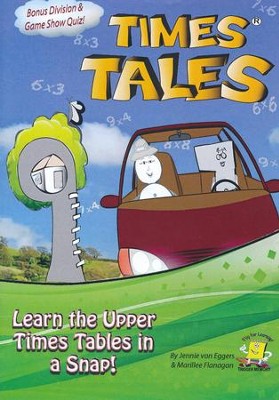
The Musical Mama
If your kid learns best to music, here is another resource for memorizing multiplication tables: https://themusicalmama.com
Math Games
Seven Ate Nine (for learning fast addition)
Take a regular deck of cards and play “war” but instead of “highest card wins” it’s “whoever solves the multiplication or addition of the two cards first” wins.
Literature
Hands-down, I recommend Sonlight literature. They pick out some of the best books!
Sarah MacKenzie, over at Read-Aloud Revival also has great recommendations for books to read.
Writing
IEW has some of the best writing curriculum I have ever seen. You’d think that since I’m a writer by trade that teaching writing would be a cinch for me. (Excuse me while I laugh hysterically for a sec…)
I’m currently using their Fix-It Grammar program for my 3rd grader, while my 5th and 6th graders are using the Medieval History-Based Writing Lessons.
You’ll need to start with Teaching Writing: Structure and Style, but I promise it’s worth all the time you invest training yourself to teach writing. Your children will thank you… someday…
Spelling & Reading
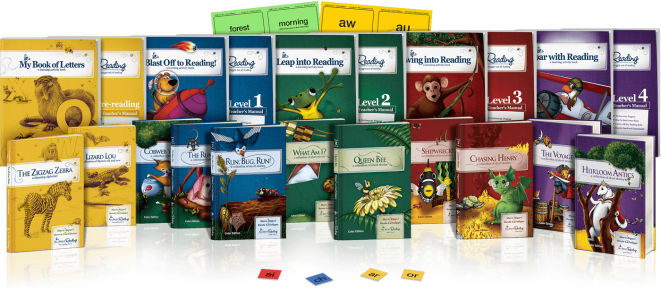
All About Learning Press has the best Spelling and Reading Programs. Your children learn phonics and the rules that go along with them.
For Reading: I recommend skipping the Pre-Reading Program unless you are teaching a very eager preschooler. Start in kindergarten with level 1. If you have an eight-year old still struggling, start with level 1. Everything builds on level 1, so you need to understand fundamentals. The beauty of this program is that you can go as fast or slow as your child requires AND it’s open-and-go! They tell you what to say as you teach!
The readers are beautifully illustrated with fun and engaging stories. I have three very confident readers!
For Spelling: The company has “placement tests” to help you decide where to begin.
Spelling City (separate from All About Learning Press) is a fun online resource in which you can enter “spelling words” for your child and they can choose from several different “games” to play using their “words.”
History
For world history, we have thoroughly enjoyed The Story of the World books. The text is written in a “story” format, which makes it a little less dry. If you want more activities, you can purchase the corresponding “activity book” which supplies coloring pages, recipes, and craft ideas.
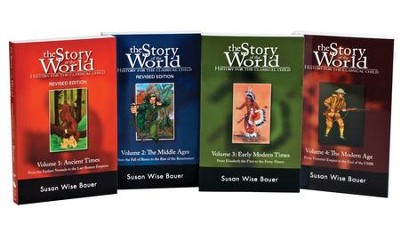
I am still in search of an American History Textbook, but when I find one I can share with you if you’re interested.
Science
For the first few years, I used Sonlight’s science program. My kids enjoyed the various short books connected with what we learning in science. More recently, we’ve been using the Apologia curriculum. It is meant for upper-elementary and the reading can be a bit of a challenge, but we enjoy it! Two years ago, we studied birds and my children can still identify local birds by name!
I hope these resources are helpful! If you ever have questions, please reach out!
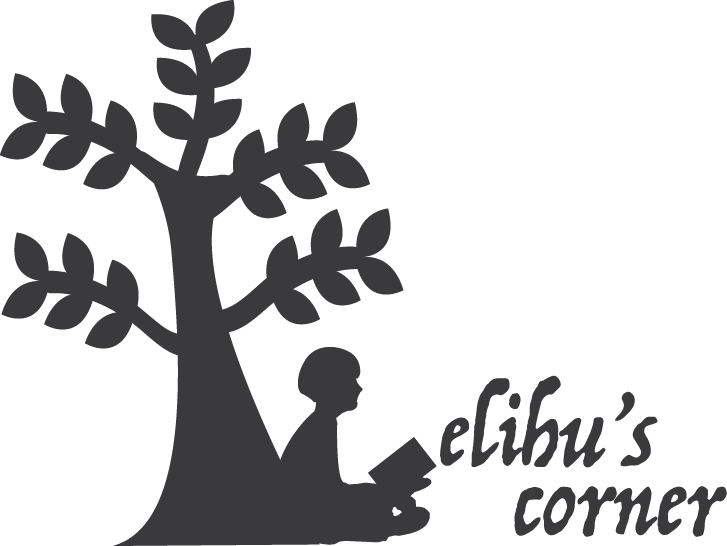
Thanks for sharing. I was home educated and would like to home educate my daughter, although my wife isn’t convinced. Pray for us please! 🙂
LikeLike
I will pray for you all! It’s definitely a difficult decision to be sure. May the Lord guide you as you seek His will.
LikeLike
Amen, thanks!
LikeLiked by 1 person
Wow I bookmarked this
LikeLike
Thank you for sharing! 🙂 https://cchomeschoolers.com/blog/
LikeLiked by 1 person
Well balanced.
LikeLiked by 1 person